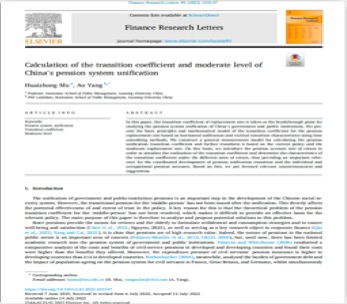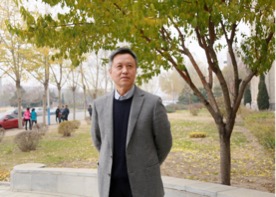The paper “Calculation of the transition coefficient and moderate level of China’s pension system unification”, written by Professor Mu Huaizhong of the School of Public Management, Liaoning University, in collaboration with PhD student Yang Ao, was published in the international journal Finance Research Letters.

Abstract
In this paper, the “replacement rate transition coefficient” is taken as the breakthrough point for studying the improvement of the integrated insurance system of China’s government and public institutions. We present the basic principles and mathematical model of the transition coefficient for the pension replacement rate based on horizontal and vertical transition characteristics and crossover of the merging of government and public-institution pension insurance using time smoothing methods. We include the quantitative measurement and analysis of the appropriate level of the replacement rate. This paper constructs a model for the total measurement of the pension transition coefficient for pension insurance integration. This is converted into the current policy-transition coefficient-evaluation model and the future moderate-level transition-coefficient measurement model, which is used to calculate and analyze the replacement-rate transition coefficient. The national social security fund rate of return and other parameters are used to calculate the rate of return in the range of 5% to 8%. This can realize the coordinated development of the payment replacement-rate level and the transition coefficient level of personal accounts and occupational annuities. On this basis, we put forward relevant countermeasures and suggestions.
Paper link:https://www.sciencedirect.com/science/article/abs/pii/S1544612322003701
About the authors:


Dr. Mu Huaizhong, Doctor of Economics, is a senior professor and doctoral supervisor at Liaoning University. He is a well-known expert in the field of social security, a member of the National "Millions of Talent Projects National candidates", a special allowance of the State Council, a Climbing Scholar of Higher Education in Liaoning Province,an outstanding expert of Liaoning Province, and a leader of the innovation team of Liaoning University and Awarded the Liaoning Provincial Achievement Award in Philosophy and Social Sciences. He has served as a subject reviewer for the Ministry of Education, the National Social Science Foundation and the National Natural Science Foundation of China for many times. He has long been engaged in research on income distribution in the national economy, population and social security, and optimal allocation of social resources. He has published more than 90 papers in core journals such as Economic Research Journal and Chinese Journal of Population Science, published 20 academic books and teaching materials, and presided over one key project of the National Natural Science Foundation of China. Four projects of the National Natural Science Foundation of China (NSFC), two of which were recognized as excellent; two major projects of the NSFC; three projects of the NSFC, one of which was recognized as excellent; one project of the Asian Development Bank; two major projects of the Ministry of Education; one major project of the Ministry of Human Resources and Social Security and the Ministry of Civil Affairs. His research achievements have won 17 provincial and ministerial awards. The founding theories mainly include: the theory of the moderate level of social security, the theory of social security gradient matching, the theory of survival equity in the three distributions, the theory of the binary welfare gap and its old-age compensation, and the theory of the demographic income distribution of national wealth.

Yang Ao is a PhD candidate in Population, Resources and Environmental Economics at the School of Public Management, Liaoning University, focusing on population structure and social security.
Read the full text: